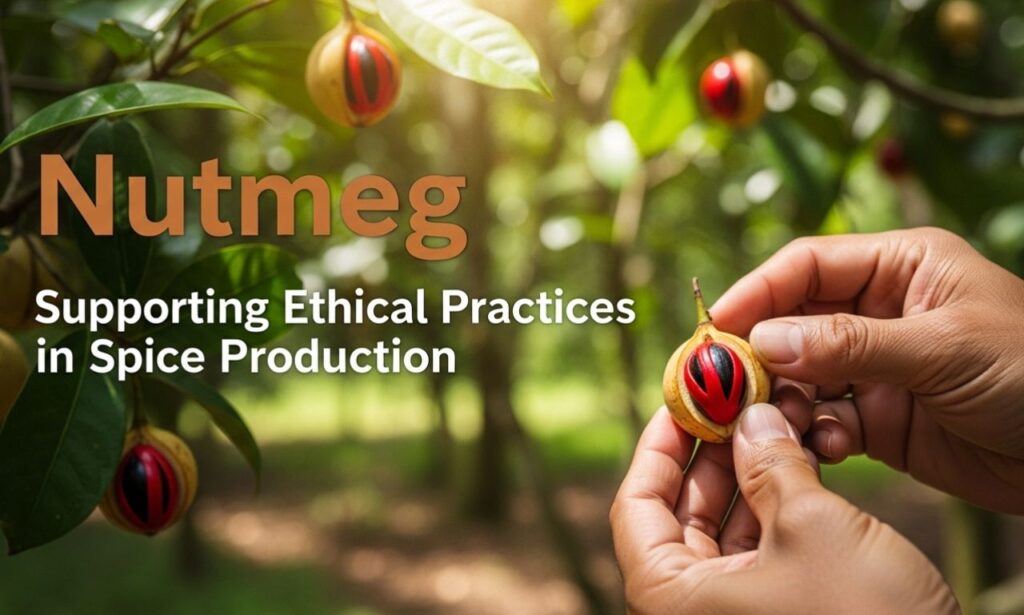The spice industry is a vibrant and essential part of our culinary world, adding flavor, aroma, and depth to countless dishes. However, behind the tantalizing flavors lies a complex web of practices that can impact communities and ecosystems far from our kitchens. One spice that has captivated chefs and home cooks alike for centuries is мушкатни орашчић or nutmeg. This aromatic seed not only elevates the taste of various cuisines but also carries significant implications for ethical production.
As consumers become more aware of where their food comes from, the conversation surrounding ethical sourcing in spice production grows louder. Understanding what goes into producing мушкатни орашчић is crucial for making informed choices that support sustainable practices while celebrating this beloved ingredient. Let’s delve deeper into the world of мушкатни орашчић to uncover its story—one filled with rich tradition as well as pressing concerns about ethics in production.
What is Мушкатни Орашчић?
Мушкатни Орашчић, known as nutmeg in English, is a spice derived from the seed of the Myristica fragrans tree. This aromatic spice has been cherished for centuries for its distinctive flavor and fragrance.
Nutmeg is often used in both sweet and savory dishes. It adds warmth to baked goods like pies and cookies, while also enhancing savory recipes such as stews and curries. Its versatility makes it a staple in many kitchens around the world.
Beyond cooking, мускатни орашчић holds cultural significance in various traditions. It’s associated with holiday celebrations and special occasions. The rich history of this spice stretches back to ancient trade routes where it was valued highly among merchants.
Moreover, nutmeg offers potential health benefits too. It’s believed to have antioxidant properties that can support overall well-being when consumed in moderation.
The Controversy Surrounding Mушкатни Орашчић Production
The production of мушкатни орашчић is shrouded in controversy. This prized spice, known for its warm flavor and aroma, often comes at a high ethical cost.
Labor practices on nutmeg plantations can be troubling. Workers are sometimes subjected to poor working conditions, long hours, and low pay. This raises significant concerns about their rights and well-being.
Environmental issues also plague the industry. Deforestation linked to nutmeg cultivation threatens biodiversity and disrupts local ecosystems. The push for higher yields often leads farmers to use harmful chemicals that affect both land and community health.
Additionally, the global demand creates pressure on producers to prioritize profit over sustainability. As consumers become more aware of these challenges, calls for transparency grow louder within the spice market.
These complexities highlight a pressing need for change in how мускатни орашчић is sourced and produced across the globe.
Impact on Local Communities and Environments
The production of мушкатни орашчић significantly influences local communities. Many rely on this spice for their livelihoods, creating a fragile balance between economic stability and environmental health.
Unsustainable farming practices can lead to soil degradation and deforestation. When forests are cleared for plantations, biodiversity suffers. The delicate ecosystems that once thrived become endangered, affecting both wildlife and human populations.
Additionally, the social fabric of these communities is often strained. Workers may experience unfair wages or poor working conditions in the quest for higher yields. This exploitation raises concerns about labor rights and ethical sourcing.
On the other hand, when ethical practices are adopted, there can be positive ripple effects. Empowering local farmers through fair trade initiatives not only uplifts their income but also fosters community resilience. Sustainable methods protect natural resources while ensuring that future generations can continue this vital tradition without compromising their environment or well-being.
The Importance of Supporting Ethical Practices
Supporting ethical practices in the spice industry is crucial for several reasons. It promotes fair treatment of workers and ensures they receive just wages for their labor. When farmers are paid fairly, they can invest more in their communities and families.
Ethical sourcing also safeguards the environment. Sustainable farming methods minimize harm to ecosystems, preserving biodiversity. This approach ensures that future generations can enjoy spices like мушкатни орашчић without depleting natural resources.
Consumers play a vital role in this shift toward sustainability. By choosing ethically sourced products, individuals send a strong message to companies about their values.
Additionally, supporting ethical practices fosters transparency within supply chains. This accountability helps combat exploitation and encourages better working conditions across the industry. It’s not just about flavor; it’s about making choices that reflect our commitment to justice and integrity in food production.
Steps Consumers Can Take to Promote Ethical Spice Production
Consumers hold significant power in promoting ethical spice production. One effective step is to research brands before making a purchase. Look for those that prioritize fair trade practices and sustainability.
Choosing organic options can also make a difference. Organic farming often supports better working conditions and environmental health, benefiting both farmers and the planet.
Another impactful action is to support local producers. By buying spices directly from local markets or cooperatives, consumers help strengthen community economies while reducing the carbon footprint associated with long-distance shipping.
Engaging in discussions about ethical sourcing on social media raises awareness among friends and family. Sharing knowledge promotes informed choices within communities.
Consider signing petitions or supporting organizations dedicated to improving labor practices in spice-producing countries. Collective voices create change, driving the industry toward more humane standards for all involved.
Initiatives by Companies and Organizations to Ensure Ethical Practices
Numerous companies and organizations are now prioritizing ethical practices in the spice industry, particularly for мушкатни орашчић. They understand the importance of transparency in sourcing and production methods.
Brands are establishing partnerships with local farmers to promote fair trade principles. This not only ensures better wages but also empowers communities economically.
Certifications like Fair Trade and Rainforest Alliance have become increasingly popular among consumers seeking ethically sourced spices. These labels help guide buyers toward products that adhere to strict environmental and labor standards.
Additionally, many organizations provide training programs for farmers on sustainable agricultural techniques. Such initiatives help reduce environmental impact while improving yield quality.
Some companies even commit a portion of their profits to community development projects in producing regions, fostering long-term benefits for those involved in cultivation. The collective effort is crucial for creating a more responsible spice market focused on sustainability and fairness.
Working Towards a Sustainable Spice Industry
The journey towards a sustainable spice industry is both challenging and essential. It involves collaboration among farmers, businesses, and consumers. Each player has a role to play in creating lasting change.
Farmers can adopt agroecological practices that promote biodiversity. This not only enhances soil health but also boosts resilience against climate change.
Businesses are starting to prioritize transparency in their supply chains. By sourcing from ethical producers, they can ensure fair wages and improved working conditions for workers.
Consumers hold significant influence as well. When they choose ethically produced spices like мушкатни орашчић, they send a message about the importance of sustainability.
Education plays a crucial part too. Increased awareness of environmental impacts encourages more informed purchasing decisions.
Together, these efforts pave the way for an industry that respects both people and the planet while ensuring flavorful culinary experiences remain accessible for generations to come.
Conclusion
The journey of мушкатни орашчић from its native lands to our kitchens is a complex one, intertwined with ethical considerations that cannot be ignored. As we savor the rich flavor it adds to our dishes, it’s essential to reflect on how this spice affects local communities and environments across the globe.
Supporting ethical practices in spice production is not merely an option; it’s a responsibility for consumers and companies alike. By choosing sustainably sourced products and advocating for fair trade practices, we can contribute to a more equitable supply chain.
As awareness grows about the challenges facing those who cultivate spices like мушкатни орашчиć, initiatives by various organizations are paving the way toward better standards. Together, these efforts can lead us toward a sustainable future where both people and planet benefit.
Embracing ethical consumption means being part of positive change in an industry ripe with potential but also fraught with issues. Through informed choices, each of us has the power to make a difference in how spices are produced and traded around the world.






